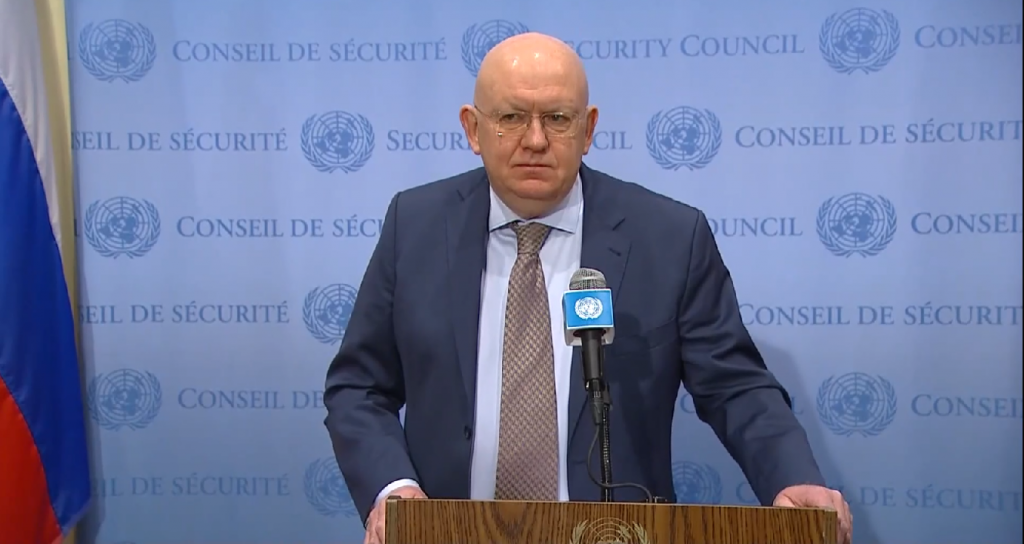Remarks to the Press by Permanent Representative Vassily Nebenzia regarding proposed draft UNSC resolution on humanitarian situation in Ukraine
Vassily Nebenzia: I requested this stakeout to brief you on an important issue. As you know, France and Mexico came forward with a humanitarian resolution on the situation in Ukraine. It has been more than a week since they introduced the initial draft. We said from the very beginning that we would be prepared to adopt a humanitarian resolution on the situation in Ukraine, provided that this is not a disguise to blame and shame Russia again.
We had a few rounds of expert consultations. I know that co-sponsors were holding separate consultations with members of the Security Council. We said from the very start that there were paragraphs in the resolution which were not humanitarian and therefore should not be in a resolution on humanitarian situation. Yesterday, under the title of breaking news, we learned that French and Mexican Ambassadors came to you and announced that instead of the Security Council, they would move this resolution to the General Assembly, which is not standard practice, as you all know. But they were citing the inability to adopt this resolution in the Council because of Russia.
As I said, we made it clear that we would be prepared to adopt a humanitarian resolution. So I think that the chances are still there. And that's why we will put forward our own draft, which is humanitarian. We will put it into the blue shortly and we'll see whether the Security Council can or cannot fulfill its mission to adopt a resolution on the humanitarian situation in Ukraine with clear humanitarian provisions, like call for negotiated ceasefire, evacuation of civilians, respect for the international humanitarian and human rights law, condemnation of attacks against civilians and civilian objects, safe and unhindered passage, unhindered access of humanitarian assistance, etc. So I wanted to advise you in advance before we come forward with it, which will happen shortly.
Q: When will Vladimir Putin stop his war crimes? When will you stop this obscene assault against Ukraine? And will Vladimir Putin surrender?
A: When the goals of the special military operation are achieved, it will stop. It was announced from the very beginning. I must tell you that I appreciate your humane approach, but I didn't see that humane approach in all these eight years when Ukrainian armed forces and radicals were shelling and bombing Donetsk and Lugansk, basically without any reproach from the international community, without comments from UN officials on that issue.
Yesterday, there was a barbaric attack of Ukrainian armed forces who used cluster munition, of which Russia is accused based on sources which cannot be identified. Again, they used cluster munition in the center of Donetsk, where 21 person died, 30 plus were wounded. There were no comments on that. I looked through news, including news by Western Media today. I didn't come across a single article on that barbaric attack.
Yesterday Secretary-General spoke at the stakeout, but he didn't say a word on that attack. Only when asked a question he said that if that was deliberate, it is condemnable. I must tell you that we are very much concerned how UN officials, including the top ones, including the Secretary-General and Under-Secretary-General DiCarlo assess the situation in Ukraine and accuse Russia of indiscriminate attacks. Yesterday, Secretary-General said that although that attack is condemnable the most of the destruction comes from the Russian forces, as if he was comparing the two and implying that the attack didn't deserve condemnation.
Q: My question is about a ceasefire. What would it take for Russia to have an overall, not just humanitarian ceasefire? What does Ukraine need to do and what's in your resolution? What are you proposing?
A: I cited a few things, obvious for a humanitarian resolution. You will see it soon shortly, when it is published.
On ceasefire, of course it should be a negotiated ceasefire. And it will take place when conditions that were put forward by Russia are implemented. They are very well-known.
Q: Could you lay out what those conditions are?
A: Demilitarization and denazification of Ukraine, no threats coming from that country to Russia, no joining NATO. President Zelensky announced perhaps a few hours ago that he understands that Ukraine will not join NATO, citing in particular his disappointment with the way NATO reacted. But the goal to join NATO is in the Ukrainian Constitution, so it should be dropped from there first and foremost.
Q: You have been very critical of the US invasion of Iraq in 2003. Russia has also been very critical of the 2011 attack on Libya led by NATO. Are there parallels between what the US did in 2003 and the unilateral actions we are seeing from Russia and the criticism that is being leveled against UN officials that are simply seeking to defend the UN Charter?
A: Every situation is unique, but I do not recall such level of outrage and hysteria regarding the US invasion of Iraq. There was no resolution as you may remember, nothing comparable to what we are experiencing today.
